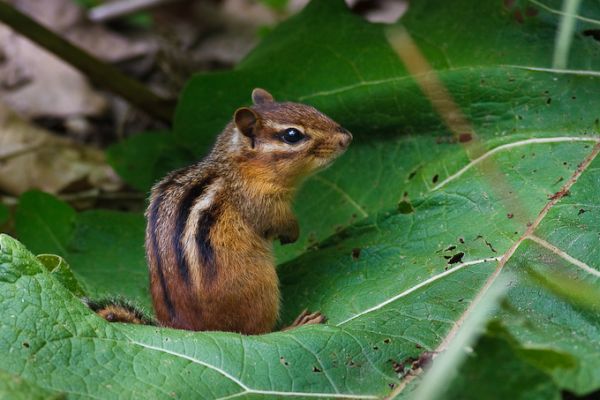
There’s not much time left to prepare for winter, especially if you’re a chipmunk.
Eastern Chipmunks don’t hibernate and they don’t even fatten up in autumn like groundhogs. Instead they stash a winter’s worth of food in their underground burrows where they live from late October to early March (in Pennsylvania) in periodic bouts of torpor.
Torpor is a short period of lowered body temperature and metabolism which conserves energy when it’s cold. For chipmunks the length of torpor is highly variable. They wake up throughout the winter to eat and even come out to forage if the weather’s nice.
Busy, busy, busy! The chipmunks haven’t disappeared underground in the Pittsburgh area yet but their deadline is fast approaching. To expedite their task they can pack up to 32 beech nuts in their cheeks before heading home. Once there, they store the food in various chambers in their elaborate burrows which extend as much as 33 feet long and three feet below the surface. Quite a palace.
I can imagine a chipmunk returning home at this time of year and inspecting the cupboard. Do I have enough food yet? Is the weather still good enough to go out and get more? Is it time to stay home and sleep?
In the next week or two a cold front will come through, the weather will turn nasty and the chipmunks will pack it in. Then we’ll have to wait for a sunny winter day to see them again.
(photo by Brian Herman)
Cute tho they are, they are rotten little things, and I’m glad to see them go underground for the winter. I hope it’s a real cold one (bite your tongue!) and they all freeze underground. My lawn is a spongy mess all over of underground burrows & holes, much of which is due to chipmunks, I’m sure. (I imagine that moles and gophers are also responsible, but I’ve seen chipmunks go in those holes, so I’m sure they are at it too.) Anyone know how to get rid of/solve this problem?
If you have backyard bird feeders, then the chipmunks are there because you’ve provided them with a good source of food. My suggestions are:
a. If there’s a way to keep the birdseed from spilling on the ground, that might help. …Might.
b. If you put out less birdseed that might help.
c. Chipmunks are food for hawks, owls and foxes. Attract one of those and your problem will be greatly reduced.
DON’T use poison. It will kill other things besides chipmunks including hawks and owls.
I feed my birds all year round, because I like seeing them. I think I’ll quit, come next April, til the fall — see if that helps. i never had such a big problem til this year. Thanks.
Libbi Strizzi – Chipmunks have their niche and are important in their own way — raptor food, disseminators of yummy fungus such as mushrooms and truffles, aerators of soil. Besides the fact that they are bold and highly entertaining little creatures. Seeing your comment has made me even more glad that I have provided my back yard chipmunks with at least 1/2 pound of almonds for their winter stores this year.
Oh, I certainly agree with you, Dagmar. And I do enjoy watching the little critters. (I just didn’t need my soil aerated quite THAT much!) I think Kate’s comment — don’t use poison — is a wise one. I’ll just take her advice next year & quit feeding the birds in April for 6 months. I COULD continue to feed the finches their thistle — that’s too small a seed to interest a chipmunk. And I could feed with the suet cakes — those don’t drop seeds on the ground. That way I’d still have SOME birds all summer.
My chipmunk problems have disappeared since i got my cat. We used to be overrun with them, but she is a killing machine! She enjoys the hunt and the kill; she doesn’t eat them. I agree they are cute, but my yard is in better shape without them. I still feed the birds year round and my cat does not bother them.